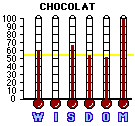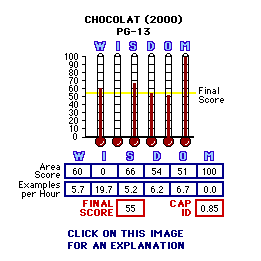Click on CAPCon Alert
image for explanation
A service to parents and grandparents
MAR21024
Chocolatw/ Guest Analysis (2000), (PG-13)
CAP Score: 55
CAP Influence Density: 0.85

Click on CAPCon Alert image for explanation |
A service to parents and grandparents MAR21024 Chocolatw/ Guest Analysis (2000), (PG-13) CAP Score: 55 CAP Influence Density: 0.85 |
 |

 Switch to LifeLine for Christian long distance service   Comments?  Christian Media News   A Singles Christian Network  Your One Stop  For Everything Christian Free Email Ministry  Subscribe Today!!  |
 Christian Banner eXchange For FREE text-only versions of our media analysis reports as they are calculated, open this email then click "send." If your browser does not handle this URL format properly, send us a request to add you. NOTE: If you do not want the plot, ending, or "secrets" of a movie spoiled for you, skip the Summary/Commentary. In any case, be sure to visit the Findings/Scoring section -- it is purely objective and is the heart of the CAP Entertainment Media Analysis Model applied to this movie  SUMMARY / COMMENTARY:
CHOCOLAT (PG-13) -- it is now okay for your 13 year olds to watch intercourse with nudity -- "sensuality" according to the MPAA. Chocolat is war of morality. It is a war between the practitioners of "if it feels good, do it" and of righteousness; between hedonism and Christianity, rather with "Churchianity" (that which might be described as a system of worship and obedience doctrines which satisfy man but any adherence to the teachings and expectations of Jesus is coincidental, superficial, or counterfeited). Chocolat is the age-old war between what hedonists say is good for you and obedience to God's Will. And, yes, Chocolat is figuratively a war between Hollywood and the CAP ministry. The lead character and hedonist, Vianne (Juliette Binoche) is presented as bright, intelligent, tolerant and enlightened. She comes with the wind to a quaint little French village bringing her chocolate confections during lent. The village is "ruled" by the wealthy bourgeois righteous one, Comte de Reynaud (Alfred Molina), the mayor of the village, who is portrayed as closed minded, intolerant, misguided and brain-washed and is easily given to underhandedness when his "kingdom" is threatened. Chocolate and lent do not mix. This time the hedonist wins and everybody, even the previously obedient ones, are happy with their new lifestyle of self which places God on the shelf, to be retrieved at the next convenience ... or need. Chocolat is also an exercise in interfering with the established way of life of a people in favor of a newcomer's beliefs and ethics [sound familiar?]. For the Star Trek fans, Chocolat is an exercise in violating the prime directive. And all is supposed to be for the good of the villagers - or for whomever will yield to the new lifestyle. But by whose standards? And at what price? One of the more disturbing portrayals to me was that it takes "new age" ethics to give abused wife, Josephine (Lena Olin) the courage to stand up to her abusive husband, Serge (Peter Stormare). The quiet and peaceful village has been living in comfortable routine. Its inhabitants lived, though mechanically, in obedience to God or at least what the Comte said was obedience to God. Then along comes Vianne with her "good for what ails you" concoctions; one as an aphrodisiac, one for poor spirits, one for just about everything else including one for giving bravado to the consumer. She would, just as does the drug dealer, give you a free sample just to get you to try it. And like the drug dealer with his/her enlightening substance, we never see Vianne or her delightful daughter, Anouk (Victoire Thivisol) sample her concoctions. Anouk, whose father is unknown, has an imaginary kangaroo friend who inaudibly speaks to her -- until the end of the show when it materializes and hops off once Anouk finally believes she has a home, a home she does not have to leave every time she starts to get comfortable. Vianne becomes the mentor, counselor and confidante for most of the women of the village (and a few of the men) advising each in how to handle their husbands, manage their affairs and solve their troubles. Sounds all well and good as long as Vianne's standards are good. But that is just it. Whether her standards were good was immaterial. Her standards seemed be whatever is required by the moment or situation. The acceptability of the "improvements" in various lifestyles and practices were by *her* standards: standards which were much, much easier than the "suffocating" restrictions of the church; standards which were sometimes a deliciously naughty deviation from righteous [Rom. 16:17-18]. One of Vianne's first concoctions was to improve the sexual performance, or at least sexual interest of a malcontent husband. And it worked. And we were shown how well it worked, at a distance but we were shown nonetheless. And so were the kids in the audience shown how well it worked. Sensing the discord developing in the village because of the contamination by the liberal ways of the new woman in town and her scandalous lifestyle and ethics down to her choice of shoes, Comte de Reynaud started spreading rumors--the truth but rumors nonetheless--about Vianne, her "ways" and her "illegitimate child." Reynaud hoped to unsettle Vianne's footing in the community enough to make her leave. To fuel the negative image of the Comte and magnify the hedonist, the Comte's wife's visit in Venice rolls from weeks to months, suggesting her intolerance of the providential life and expressing her intolerance by leaving him rather than just visiting as he says. And as if Vianne was not enough of a headache for the Comte, Roux (Johnny Depp) shows up with his "wandering gypsy" group. Roux complicates the efforts to prevent contamination of the way of life in the village with outside influences. Roux and Vianne get along together fabulously (imagine that!), fall in love and make love (out of wedlock, of course) [1Ths. 4:2-5]. And in an effort to eliminate the threat, Serge sets fire to Roux's houseboat, thinking the Comte had ordered him to do so -- a very good portrayal of the need to be careful not only of what you say but in how to say it AND to whom. We are also treated to how Vianne's mother and father conceived her while under the influence of the very secrets Vianne added to her chocolate concoctions. And the nudity was not masked. It is now okay for your 13 year olds to watch intercourse with nudity -- "sensuality" according to the MPAA. Child Protective Services call showing children sexual pictures abuse. God calls it sin. And, of course, when the logic of the script called for statements such as "I'm his mother and I know what is best for him" from one of the town mothers, such God-given responsibility was belittled and made to appear as closed minded and abusive. Well, what we are doing helps you, mom (and dad). We tell you the truth about the content of a movie so YOU can make an informed decision whether a flick is fit for your kids without the pressures of word of mouth, advertisements, and pleas from your progeny and the pressures on them from their peers. Among the more serious issues of concern to parents and grandparents are likely the intense content of impudence, particularly the rebellion against God's Word in favor of the hedonism. There was much to fuel adolescent argument in favor of serving the self before all else and much to simply believe that God's Absolutes are optional by implanting short-sightedness (failure to think beyond the here-and-now). As always, I ask you to rely more on the listing and comparative scoring in the Findings/Scoring section than this commentary in summary format. There is MUCH more ignominy in this artsy film, far too much to even summarize. So, please be sure to visit the Findings/Scoring section. If needed to focus or fortify, applicable text is underlined or bracketed [ ]. *******Food for Thought******* As always, it is best to refer to the Findings/Scoring section -- the heart of the CAP analysis model -- for the most complete assessment possible of this movie. FINDINGS / SCORING: 
NOTE: Multiple occurrences of each item described below may be likely, definitely when plural. Wanton Violence/Crime (W): Impudence/Hate (I)(1): Sex/Homosexuality (S): Drugs/Alcohol (D): Offense to God (O)(2): Murder/Suicide (M)(3): SPECIAL: This is a Special Guest MMMitt Analysis Analysis by John Mittler, aka Movie Rat from Finland. Visit MMMitt Analysis for an explanation of their rating codes. Presenting guest analyses from MMMitt Analysis is an effort to join together Christians who battle sin in sinema from both continents. On our way to world-wide presence, the CAP Ministry is honored to bring to you the insight of our fellow Soldiers of Finland. John is featuring CAP analyses on his website and will occasionally be sending us his analyses of movies which are playing in Finland before release in the US for the CAP to share with you. Let us welcome MMMitt Analysis with love and in service to our Lord. Genre: Drama Age limit in Finland: 11. US: PG-13 CAP NOTE: This film is by Disney-owned Miramax, the makers of Pulp Fiction. Content rating: 1a) Female body 6.4 light nightgown hardly at all hides the centers of breasts from sight, pin-up pictures on the wall, nude female figure made of chocolate, very wide neckline with push-up equipment, without shirt seen from behind 1b) Male body 6.6 without shirt, shorts reach to half thigh 2) Violence 6.7 trying to strangle a human being, hitting someone's head with a heavy tool, violent pencil drawings 3) Intimate relationships (concerns primarily the main characters) 6.3 free intimate relationships, three different divorces, whose reasons are not introduced too closely 4) Stimulants (concerns primarily the main characters) 6.4 smoking, getting heavily drunk out of alcohol 5) Property (concerns primarily the main characters) 6.5 clear differences in the standard of living of people, some economic crimes are included in the plot of the film 6) Language 6.4 using once for swearing a holy name connected with a well-known religion, 7 mildly vulgar expressions, which are used for swearing one so-called hard swear-word, whose meaning is eternal kingdom of destruction [the Finnish translation doesn't use a holy name for swearing] 7) Truth (concerns primarily the main characters) 6.8 no supernatural events take place in the movie, but faith in supernatural forces belongs to the plot of the film [the stage of the film is a deeply religious Christian village, and the sacraments of Christianity are used quite industriously] 8) Beauty 6.9 generally the film respects the traditional beauty ideals quite comprehensively... along with the charming landscapes are seen rusty tapwater, playing with an earthworm, dead birds, bruise in forehead, a tattoo or two, and very mild conformity in the beautification of man and woman 9) Music 7.0 church organ, classical orchestra, hymns are sung in church, light guitar music
 |